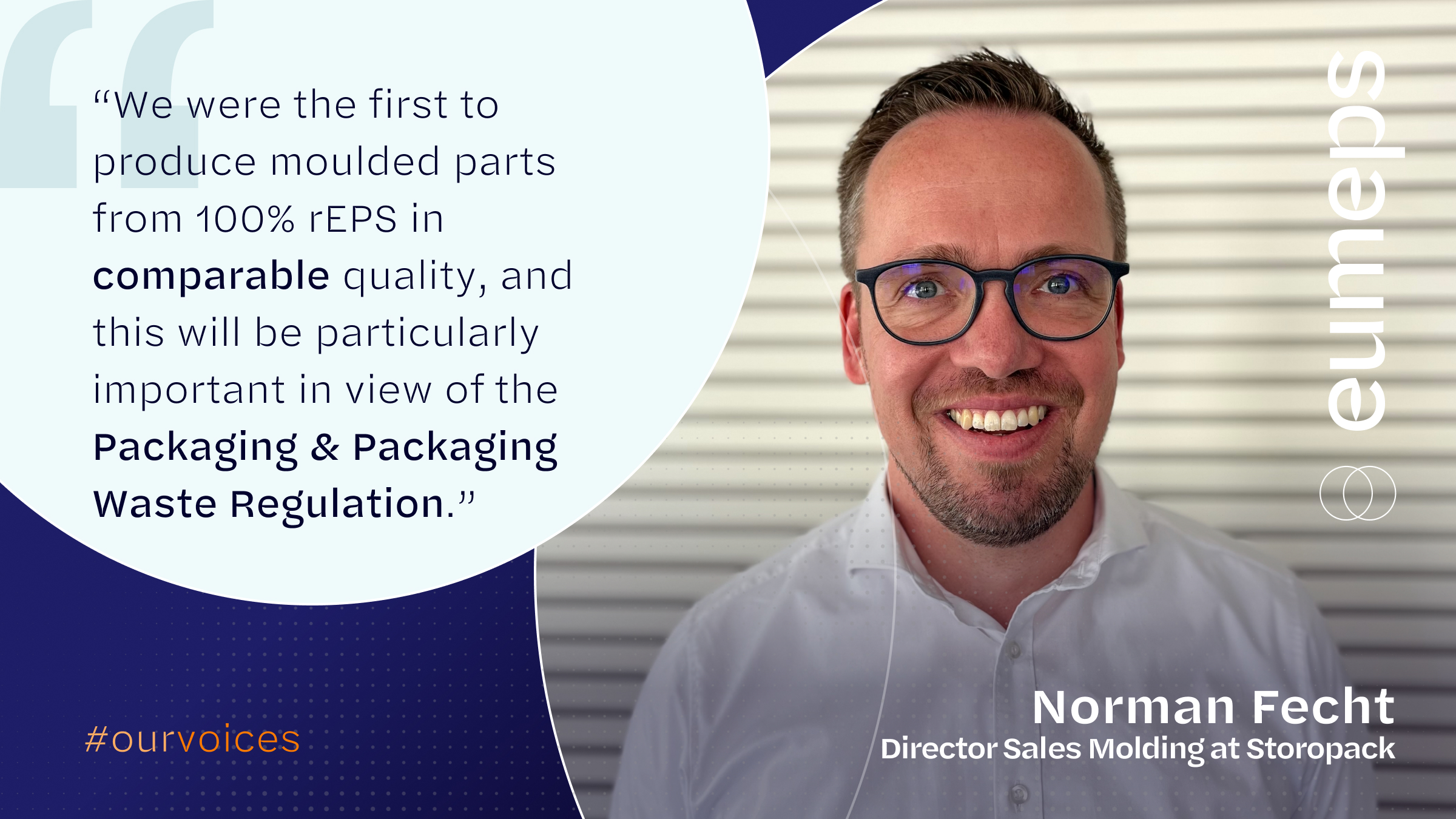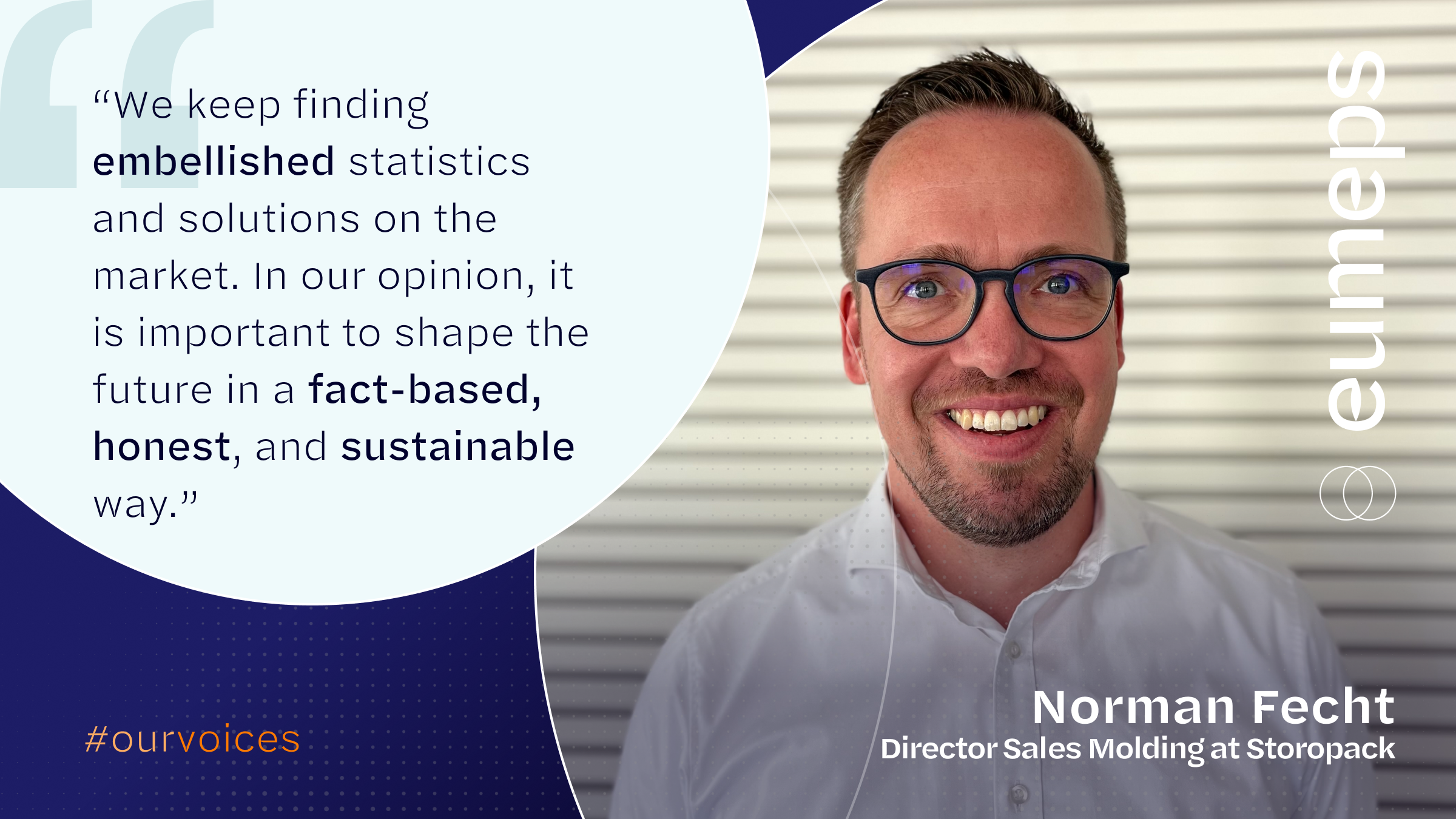Norman Fecht has worked in the EPS packaging sector for over a decade. As Director Sales Molding Germany at Storopack, he brings practical insights into technical moulded parts and packaging solutions, with a strong focus on sustainable development and long-term customer relations. In this interview, he reflects on his professional path, the evolution of the EPS industry in Germany and Europe, and the challenges and opportunities linked to regulatory shifts and material innovation.
Could you share your professional journey leading up to your current role as Director Sales Molding Germany at Storopack? What attracted you to the EPS packaging sector, and what do you find most compelling about working in this industry?
I started at Storopack with a dual degree in industrial engineering. After graduating, I had the opportunity to go straight into sales, and it was great to work with people, shape things, and, of course, drive projects forward.
After several years with different responsibilities, I was given the opportunity to take over as Director Sales Molding Germany about 3 years ago.
I came to the EPS sector by chance. Storopack is well known in the industry and highly regarded as an employer. EPS is a great material with many possibilities in packaging, but also in technical applications. I am truly convinced that plastic, used correctly, is part of the solution!
Storopack is a specialist in protective packaging and technical moulded parts, serving a wide range of industries. How does Storopack foster innovation in these areas, for example, by using advanced materials like recycled EPS (rEPS) and bio-based foams, and could you highlight any recent product developments or initiatives that you are particularly proud of?
The great thing is that we can offer our customers several different solutions, and our customers can choose what best suits their needs. We were the first to produce moulded parts from 100% rEPS in comparable quality, and this will be particularly important in view of the PPWR (Packaging & Packaging Waste Regulation) 2030.
At the same time, we are of course also developing other materials, such as starch-based foams or paper-based materials. As we are a family-run company, values are very important to us, and we always think in the long run to be successful together with our customers.

Sustainability and circularity are priorities for Storopack. In 2023, 43% of your in-house manufactured products were made from renewable or recycled materials, and Storopack developed the first fully integrated, patented process to produce recycled EPS beads (rEPS) in-house. How are you building on these efforts to enhance EPS circularity and overall sustainable practices, and what challenges do you face in making packaging more sustainable?
In 2024, we have already reached 49%, which means that we will fully meet our target of 50% in 2025. Nevertheless, as you know with PPWR, we will continue to increase the share of renewable and recycled materials in all our core products over the next years.
One challenge is the evolving and changing environment and regulations. Things can change immediately, and at the same time, not all requirements are fixed.
In this dynamic environment, combined with the difficult economic situation in the EU/Germany, customers want to drive sustainability with us, but are sometimes under pressure.
In parallel, we keep finding embellished statistics and solutions on the market. In our opinion, it is important to shape the future in a fact-based, honest, and sustainable way.

What are the key challenges and opportunities for EPS packaging and technical moulded parts in the German market? Germany’s strong recycling culture – as seen in a recent pilot project that successfully recovered and recycled EPS from household waste – along with strict regulations and high consumer expectations, can both drive and constrain the industry. How do these factors influence Storopack’s strategy in your home market?
As we think long term, we will continue to do the right things. Sustainability is key, and in the meantime, we have to handle the situation we face.
For plastics—and of course, as more and more industrial production is relocated to the East and Far East—I truly believe that technical applications will stay and help to develop the EPS industry. Nevertheless, I am sure that the European and the German economy is strong and will recover in the coming years.
Sometimes, due to misinformation, plastics have a tough standing. We drive circularity and promote this great material to show the positive impact on true sustainability.
At the European level, what major trends or challenges do you foresee for the EPS packaging industry? With new EU policies like the Packaging and Packaging Waste Regulation raising the bar for sustainable packaging, how is Storopack gearing up to adapt and find opportunities in this evolving European landscape?
We started years ago to go in that direction. The situation is complex, and of course, everybody has limited resources, but diversification and the development of sustainable solutions are key to long-term success.
In parallel, our sustainability team is in contact with all the actors to understand and play an active role in this development to support an independent and good solution.
Storopack’s ethos as a global family-run company combines tradition with innovation. How would you describe your own approach to leadership and building successful teams, and in what ways has this company culture influenced your management style and decision-making?
We always work with people—employees, customers, and suppliers. We have some core values, but in general, I think it is important to treat people as you would like to be treated. Years ago, a handshake used to be obligatory, and so we try to act today. In our opinion, trust, respect, and reliability are very important. Personal responsibility, passion, and creativity are key to success.
Throughout your career, what have been some pivotal experiences or lessons that significantly shaped your professional growth? How do you continue to develop your expertise and stay ahead in a rapidly evolving packaging industry?
Sustainability is becoming increasingly important and is creating completely new conditions. The market is changing, the customers have different requirements, and future competitors are new for us.
It is always important to stay curious, explore new ways, and be flexible in responding to changes. Of course, change sometimes hurts, but there will be several chances if you face the challenge in an optimistic way.
To master the development, it is important to have good communication in an interdisciplinary team and rely on our long-term partners, customers and suppliers.
Looking ahead, what is your outlook for the future of EPS in the packaging sector? With increasing emphasis on sustainability, how do you envision EPS evolving or maintaining its role as a competitive and environmentally responsible packaging material in the coming years?
In my opinion, EPS—and of course plastics in general—are underrated and are significantly better than their reputation suggests. Simply switching all packaging to fibre-based products is not the solution.
With appropriate recycling, plastics can make a significant contribution to sustainability. It is important that we work hard now to close the loop so that we are ready for the period beyond 2030. Recycled plastics will make a difference.

On a personal note, is there a particular mentor, experience or inspiration that has fueled your passion for this industry? How has that influenced your commitment to the EPS packaging sector and the choices you’ve made in your career?
As the saying goes, the grass is always greener on the other side. I had a great start, learning a lot from my first boss, and so I do today from my current one and several more people in my surroundings. EPS is more than packaging, and Storopack is more than EPS. I believe in openness and honesty, and of course, I always strive for the best solution.
This conversation with Norman Fecht highlights the pragmatic steps being taken by EPS manufacturers to adapt to a changing regulatory landscape while maintaining product performance and supporting circularity. His perspective underlines the importance of technical development, industry cooperation, and transparent communication in ensuring that EPS continues to meet environmental and economic expectations across Europe.

